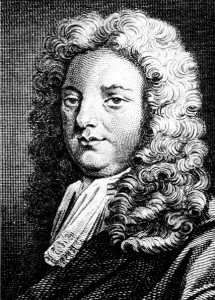Amphion Anglicus: Dr. John Blow ‘The Most Incomparable Master of Musick’
Apollo’s Harp at once our souls did strike,
We learnt together, but not learnt alike:
Though equal care our master might bestow,
Yet only Purcell e’re shall equal Blow.
 This panegyric, written on Purcell’s death by Hereford Cathedral organist Henry Hall, who together with Purcell had studied under Dr. Blow, reflects how closely the reputations of the two great composers of Restoration England were entwined. To the extent that he is known today, John Blow is primarily remembered for his association, first as teacher and then colleague, of the marvelous Henry Purcell. However, during his lifetime he was the most celebrated and influential musician in England.
This panegyric, written on Purcell’s death by Hereford Cathedral organist Henry Hall, who together with Purcell had studied under Dr. Blow, reflects how closely the reputations of the two great composers of Restoration England were entwined. To the extent that he is known today, John Blow is primarily remembered for his association, first as teacher and then colleague, of the marvelous Henry Purcell. However, during his lifetime he was the most celebrated and influential musician in England.
Born in Newark in 1644 and conscripted into the Chapel Royal as a chorister when he was just six, Blow’s entire life was centered around the court in London where he served in many positions as organist, composer, keeper of the royal instrument collection (a position held subsequently by Purcell) and perhaps most significantly as master Master of the Children of the Chapel. In his capacity as educator he had a formative influence on several generations of English composers. He pokes fun at his own teaching methods in the sarcastic Cupid’s Lesson in Venus and Adonis – satirizing the denizens of the court at the same time.
He was described by a contemporary as ‘a very handsome man in his person, and remarkable for a gravity and decency in his deportment…a man of blameless morals and of a benevolent temper but not totally free from the imputation of pride.’ But then he had much to be proud of, having produced an astonishing wealth of music, primarily odes, services and anthems for use at court. Already in 1677 he was awarded the first Lambeth degree of Doctor of Music in recognition of his preeminence among church musicians.
In 1679 he resigned from his position as organist of Westminster Abbey specifically to create a vacancy for the gifted young Purcell and the two shared a close relationship and friendly rivalry throughout the 1680s. They clearly influenced each other’s compositions and, given the difficulties of dating many of the ttheir works, it is often impossible to determine who was borrowing from whom.
In the case of the two composers’ operas it is clear that Blow’s one work in the genre, Venus and Adonis, was written first served as the model for Purcell’s Dido and Aeneas. The links between the two works are apparent. The libretti, though by different authors, share many traits: the inclusion of cupids, the use of the chorus in a variety of roles (shepherds and shepherdesses, huntsmen, etc.), and the central role of the wild boar. (The bearing onstage of the dead beast’s head in Dido and Aeneas has been seen as a direct reference to the beast that brought down Adonis in the earlier opera.)
The musical connections of the two operas are even more significant. Each is constructed with a prologue and three acts (though the music for Purcell’s prologue is lost) that display similar key relationships and each culminate with a tragically intense lament and chorus. Further details (e.g. the walking bass lines in the second acts and the declamatory style in general) link the two works.
Blow outlived his pupil and colleague by more than a decade and in 1700 a new post at court was created for him as Composer for the Royal Chapel. He continued to compose til the end of his life in 1708. The numerous dedications and odes to Blow’s consummate musicianship found in Amphion Anglicus, a compendium of his songs published in 1700 attest to the high esteem in which he was held by his fellow musicians.
Thus Bird, a British Worthy, spread his Name
And for his Country gain’s this early Fame;
And down from him, in Time’s successive Flow,
Many a Noble Genius cou’d we show,
But not One Greater, None more Excellent than Blow.
Magnificat will perform Dr. Blow’s opera Venus and Adonis on the weekend of October 8-10. Click here for more information and to purchase tickets.